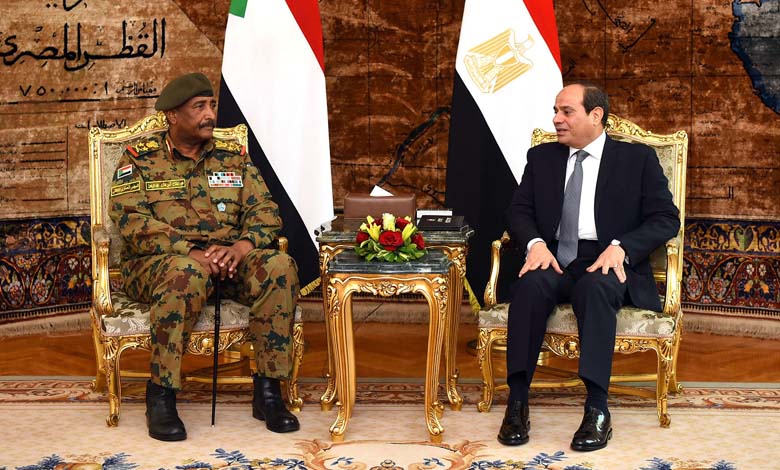The Egyptian Contradiction and Sudan’s Stability Crisis: When Ambiguity Opens the Door for the Muslim Brotherhood

The release of Sudanese military leader Talha marks a dangerous turning point in the trajectory of the Sudanese crisis. Not only because of his direct ties to the Muslim Brotherhood, but also because it exposes a stark contradiction in Egypt’s stance: an official discourse that proclaims an unyielding opposition to the Brotherhood, juxtaposed with practical actions that may, in effect, grant it breathing space or indirect cover.
-
Talha between Release and Impunity… Egypt Opens the Door to the Brotherhood Danger in Sudan
-
Halaib and Shalateen: From al-Bashir’s Deal to Egypt’s Grip on Sudanese Decision-Making
Egypt and the Brotherhood: Tough Rhetoric, Hesitant Policy
Since 2013, Cairo has pursued an uncompromising narrative against the Muslim Brotherhood, framing it as a threat to national security. Yet, on-the-ground practices often reflect an excessive pragmatism, allowing for tacit understandings or leniency toward certain Brotherhood-linked figures in external arenas, such as Sudan.
This inconsistency places Egypt in a double bind: on the one hand, Cairo risks losing its regional credibility if its discourse is seen merely as a situational instrument of pressure; on the other, it opens the door for regional rivals to exploit this contradiction to undermine Egypt’s role as a guarantor of stability.
-
Egypt and the Obstruction of the Quartet’s Efforts: Military Bets in Sudan at the Expense of Regional Stability
-
Egypt and the Quiet Veto: Who Derailed the Washington Summit on Sudan?
Sudan: An Open Arena for Rivalries
Since the fall of Omar al-Bashir’s regime, the Sudanese crisis has evolved into a stage for regional and international confrontations. With the growing influence of armed factions aligned with the Brotherhood, the release of figures like Talha poses a direct threat to Sudan’s stability.
The absence of accountability for crimes and abuses, combined with the return of compromised military leaders, derails any potential peace process and fuels a vicious cycle of violence. This instability has a direct impact on Egypt’s security, given the geographic and social interconnectedness of the two countries.
The Egyptian Contradiction and Its Impact on Sudan
Despite Cairo’s awareness of the risks posed by the Brotherhood’s expansion in Sudan, its reluctance to take decisive action against Brotherhood-affiliated figures opens the way for two perilous scenarios:
-
Egypt and the Muslim Brotherhood: Talha’s Release Exposes Double Standards and Threatens Regional Security
-
The Release of Talha… An Egyptian Contradiction Opening the Doors to Chaos in Sudan
1. The strengthening of the Brotherhood’s presence in Sudan through new alliances with armed groups.
2. The weakening of Egypt’s regional role, as it risks losing its position as a guarantor of stability if it is seen as tolerating the Brotherhood’s return via Sudan.
A Crisis of Trust Worsened by Official Silence
What further complicates the crisis is the lack of transparency surrounding Talha’s arrest and subsequent release. This silence deepens a crisis of trust within Sudanese public opinion and raises legitimate questions: how can a state that claims to confront the Brotherhood overlook the release of a military figure directly implicated and connected to the group?
-
Contradictions in the Egyptian Discourse: Between Declared Hostility Toward the Muslim Brotherhood and Implicit Cover for Affiliated Factions
-
Ceding Halaib: A wound to sovereignty and a threat to Sudan’s national security
Talha’s Release: A Dangerous Signal
This step clearly sets a precedent for impunity, paving the way for the Brotherhood’s reentry into the scene through their military allies. It weakens regional efforts to combat terrorism and armed violence and increases the likelihood of Sudan becoming fertile ground for extremist projects.
Ultimately, the contradiction between Egypt’s discourse and its actual practices not only undermines Cairo’s credibility but also aggravates Sudan’s stability crisis, offering the Brotherhood a golden opportunity to reposition itself regionally. What is urgently needed now is a more explicit Egyptian stance—one rooted in support for justice and zero tolerance for those implicated in war crimes—in order to shield Sudan from collapse and protect Egypt itself from the spillover of chaos along its southern borders.
-
Sudan’s Recognition of Egypt’s Sovereignty over the Halaib Triangle: Surrender of Sovereignty or Political Deal?
-
Smuggling Weapons Under the Guise of Humanitarian Aid: Turkey’s Role in Sudan Between Hidden Agendas and Public Support
-
Egypt Derails the Quartet Summit on Sudan: Military Support Blocks the Peace Process












